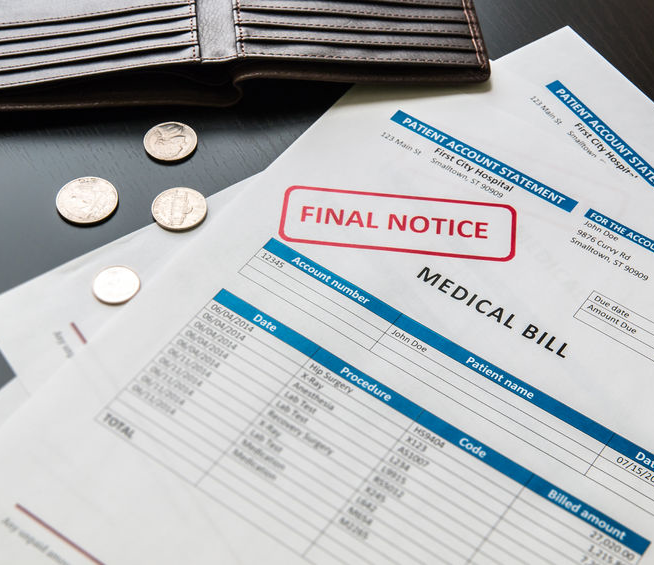Will Medical Debt Show Up On My Credit Report?

Being seriously injured or going through a debilitating illness can be quite disruptive for your life in many ways. Of course, your body needs time to heal, which can put other things like work, sports, and many leisure activities on the back burner.
When money is tight, it’s a good idea to create a budget that suits your lifestyle.
However, in addition to your personal life, your finances will also be affected in the form of the medical bills you receive. If these medical bills go unpaid long enough, they could find their way onto your credit report and negatively affect your credit score for years.
In this article, we will take a look at how unpaid medical bills can affect your credit and how they can find their way onto your credit report.
What is a Credit Report and Credit Score?
Before diving into how medical debt affects your credit and if it will show up on your report, let’s talk a little bit about credit reports and credit scores.
Your credit report is a document that contains a variety of credit information, such as the loans you have, your bill payment history and more. They help a lender decide whether you are a good candidate for new credit to or not. They will also use your credit report to determine what sort of interest rate they will give you.
When a lender pulls a copy of your credit report, it’s known as a credit inquiry.
Your credit score is a number that ranges from 300 to 850. Essentially, it’s used as a simple way to judge the health of your credit without having to go through your entire report. A score of 700 or over is considered decent, meaning you shouldn’t have any trouble getting a loan and a good rate.
Want to know how your credit score gets calculated? Check out our infographic.
It’s important to keep your credit in good shape, as a healthy credit report and high credit score will likely get you access to better loans and interest rates, while an unhealthy report and low score will likely afford you more expensive ones.
How Do My Medical Bills Affect My Credit?
So, just how do medical bills affect your credit? Unlike banks and credit unions, which normally have direct relationships with credit reporting agencies (Equifax, TransUnion, Experian), hospitals and doctors do not. As a result, there is a 180 day waiting period that needs to pass before your credit report will show unpaid medical debt.
Of course, most credit reporting agencies won’t even hear about your medical debt unless it goes unpaid, so do your best to pay off your medical debt, if possible, to avoid any potential damage to your credit. Like any typical lender, your medical provider can also turn your debt over to a collections agency, so you should always be prepared for that, just in case you ever have unpaid medical bills.
Not paying your medical bills is just like not paying your credit card bill, so it will negatively affect your credit just the same. The only difference here is that it takes a longer amount of time for unpaid medical bills to show up on your report.
Wondering what really happens when you ruin your credit? Find out here.
Can I Stop Medical Bills From Going on My Credit Report?
As you can see, having unpaid medical bills show up on your credit report can often lead to negative consequences, especially if the account goes into collections. However, is there a way to stop these medical bills from going on the report? The answer is yes.
First things first, you need to speak with your health insurance provider and be aware of everything they will pay for and everything they won’t. If you cannot afford a bill that you have been given, you can also try and negotiate the bill down to a lower amount, so you will be able to pay it off easier. While this may not work, it is worth a try and could be the difference between having medical debt show on your report or not.
Also, with options like GoFundMe, crowdfunding your medical bills is also a viable approach when you can’t foot the entire bill. Friends, family and even strangers might be willing to help. If you find yourself dealing with multiple medical debts, it might be worthwhile to hire a billing advocate. These people will not only manage and organize your debts for you, they may also be able to negotiate them to lower amounts.
Looking for more debt solutions? Check this out.
Can I Remove Them From My Credit Report and Credit Score?
Let’s say that you already have medical debt on your credit report. There is a good chance it could soon begin to negatively affect your credit score. So, is there a way to remove medical debt from your credit report and credit score?
Unfortunately, if the unpaid debt is legitimate, there is nothing you can do to remove it from your credit report, other than pay it off and wait for the negative effects to lessen over time. Even then, collections accounts can take seven years to drop off your credit report. While the impact of the accounts on your credit score will decrease slowly, securing loans will certainly be more difficult during that stretch.
Need to know how you can get a loan with bad credit? Read this.
Disputing Errors on Your Credit Report
However, if you feel that the medical bill that was sent to collections was an error, you will be able to dispute it. To do so, you will need to gather evidence that the debt has already been paid or isn’t correct, then file your dispute with the credit bureau in question. They are required by law to provide a follow-up, during which you should maintain communication with them and see what can be done.
While there are no guarantees that the error will be removed, it is worth the effort, if only to prevent the negative effects of a collections account on your credit report.
The good news is that if your insurance covers your bills, the medical debt will drop off your credit report. However, if you have unpaid debt on your report stemming from a bill that your insurance provider should have paid, you need to reach out to them to rectify the mistake.
Looking for some ways of improving your credit score today? Take a look at this.
Yes, Medical Debt Will Show Up On Your Credit Report!
In conclusion, medical debt can be a daunting thing to deal with, especially if your bill is substantial and you are confused about whether your insurance will pay for it or not. We hope this article has helped you understand what sort of impact medical debt can have on your credit report and how you can do your best to minimize the damage to your credit score.



